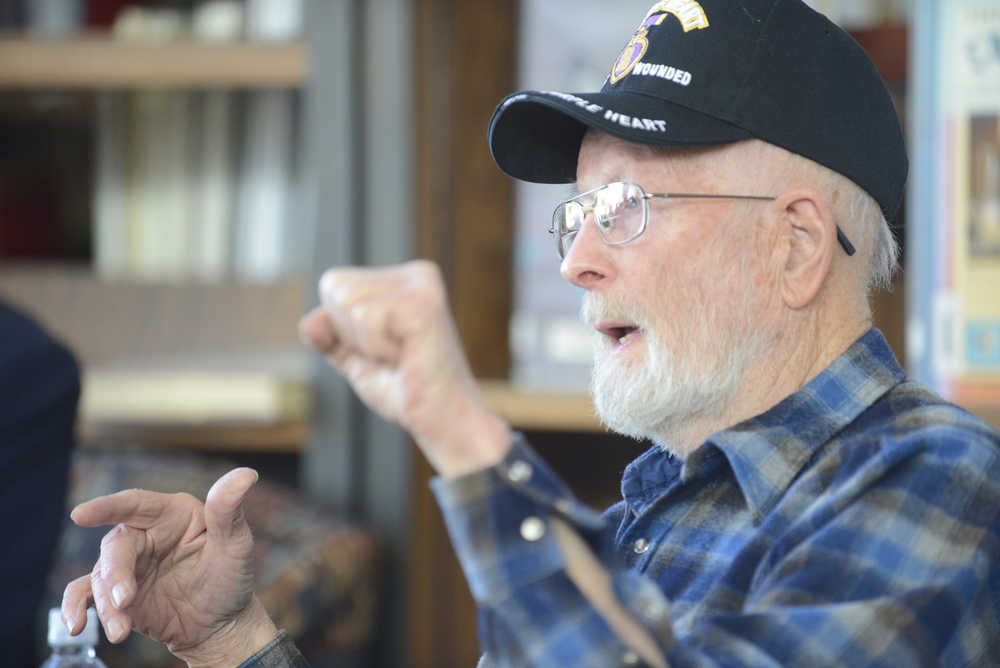Kenai Central High School history students supplemented classroom lessons on foreign wars with accounts of real life experiences Thursday.
Sophomores and juniors heard personal accounts from nine local veterans who in return fielded a series of prepared questions including “Where did you get shot?” and “What was the funniest thing that happened to you?”
“They had some good ones,” said Iraq War veteran Gregory Fite, who served in Operation Iraqi Freedom. “You have to give them that.”
Fite’s fellow presenters included members of the American Legion and the Veterans of Foreign Wars who had served in World War II, the Korean War, the Vietnam War and Operation Desert Storm in the Gulf War.
Teacher Maria Calvert, who organized the visits, said having the veterans come to the school put a face to the events the students are learning about in the classroom.
Korean War Veteran Jack Dean spoke about this role as a Rifle Squad leader during the battle for Hill 851 as part of the 17th Regiments battle for Chup’a-ri, North Korea, during early September, 1951, which earned him a Silver Star Medal. Talking openly about the experience, including his mistakes, relieved the Post Traumatic Stress Disorder the five days of fighting left him with, he said. During the of fighting, Chinese soldiers broke through I Companies front line.
“They penetrated almost to the company command post and killed the artillery observer with a grenade,” Dean said. “The situation looked hopeless. Our squad counterattacked and restored the perimeter. They kept attacking for four hours but I Company repulsed every attack.”
Dean mentioned the soldiers he killed on the opposing side, and remembers advising his men to “hose them down out there.” The situation was “kill or be killed,” he said.
“That experience left me with nightmares,” Dean said. “I have relived it thousands of times.”
Dean was shot in the hand three months later, and that was the end of his infantry career, he said with a laugh. After the war he was silent, until he began eight years of steady research on the Korean War, and began attending regimental reunions where he learned “talking about it could be a catharsis.”
AP United States History student Mikaela Salzetti said she was excited when she heard local veterans were coming to speak at the school.
“Listening to people talk about it — it’s not the same as experiencing it, but it’s different than learning from a book,” Salzetti said. “It’s more powerful. These are real people not just words in a book.”
Salzetti said she believes pride is a key societal characteristic in the United States, but most people do not tap into that feeling until it is put in jeopardy. Hearing the veterans speak made her realize the divide between the politics behind war and the act of fighting in one.
“They just defend their country without a second thought,” Salzetti said. “I feel like the politics are something different than the people who are actually fighting.”
Salzetti’s classmate Hannah Drury said she went into the presentations curious about the veterans’ reasons for entering the United States Armed Forces. She said their answers complemented what they were already learning in the classroom.
“I could see the impact they made on our freedom and how they affected people,” Drury said.
Vietnam War veteran Mike Meredith said he related to the students. Everyone is 17 at some point he said. He said he hoped his discussions that day imparted the importance of preparing for the future.
“Next year you have power,” Drury said referring to the students who would be turning 18 — the legal voting age.
Fite said he remembered being in Iraq the first day citizens were able to vote. No one was allowed to drive because of safety concerns involving car bombs. Two young boys carried their grandmother to the polls so she could vote, he said.
“Do you see that happening here? No,” Fite said to the table of students surrounding him. “We take it for granted.”
Gulf War veteran Richard Williams said he hopes students understand the errors of history so they are not “doomed to repeat” the same mistakes.
“Freedom is not free, it’s paid for,” Fite said. “It’s paid for by human lives and sacrifice.”
Not all of the discussions Thursday were serious.
Williams recalled a campaign that involved wrangling a rogue cow. It involved six hours and 13 guns.
“You know what a 1,200 pound cow has to do to damage a vehicle?” Williams asked the class. “Change directions.”
The final question Fite answered was to what places his time in the service had taken him.
“Canada, Germany, Ireland and the airport,” Fite said. “It counts. I had a drink there.”
Reach Kelly Sullivan at kelly.sullivan@peninsulaclarion.com.


